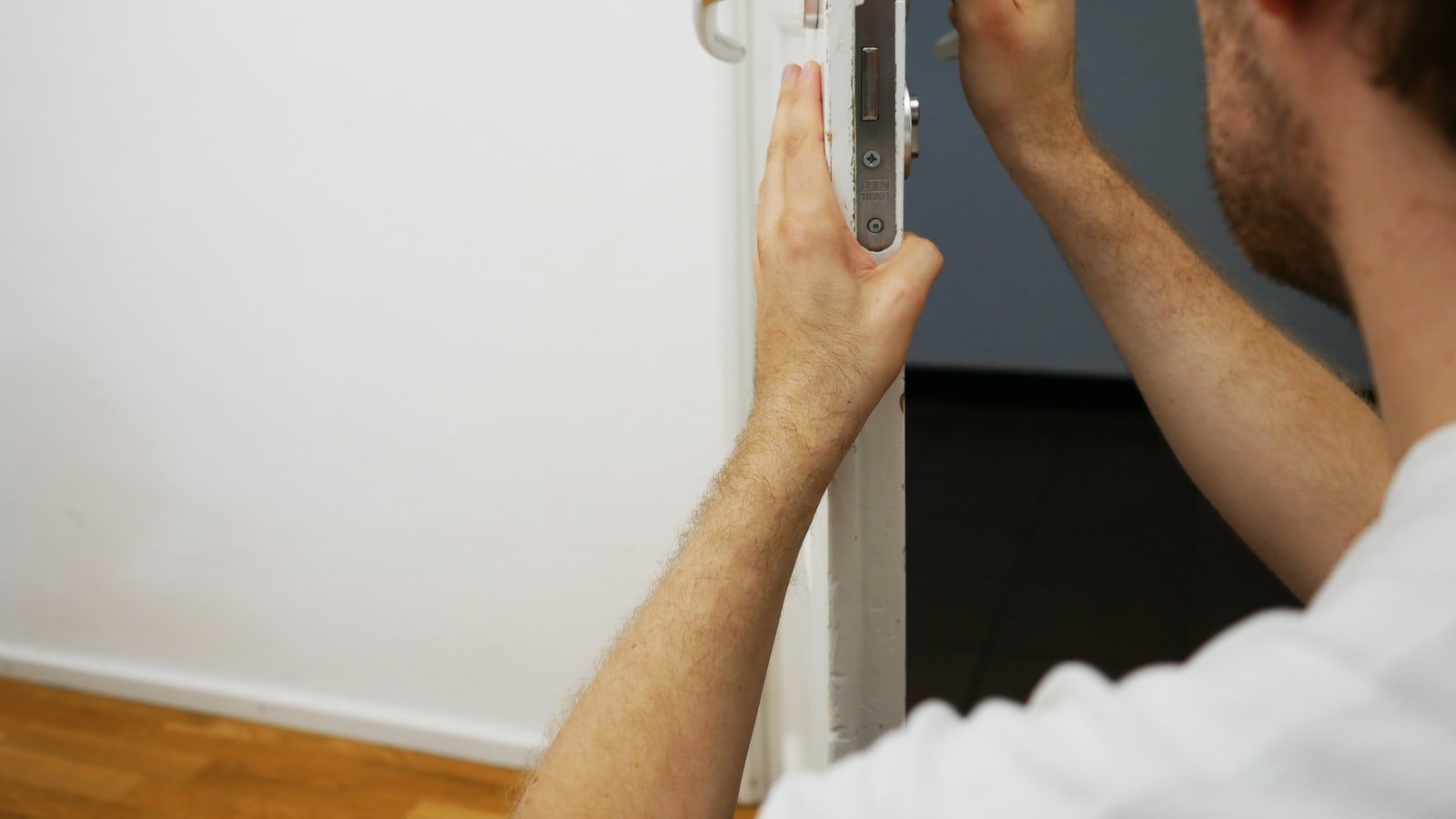In the world of locks, keys, and security systems, locksmiths and lockpickers often find themselves on opposite sides of a delicate ethical divide. While the former devote their skills to safeguarding homes and businesses from unauthorized entry, the latter possess a unique talent for opening locks without the traditional key. It is a perpetual clash between the upholders of security and the masters of surreptitious access – a fascinating dichotomy that beckons us to question: who, in this intricate dance between locksmiths and lockpickers, can truly claim the moral high ground?
Table of Contents
- Introduction: The Ethics of Locksmiths and Lockpickers
- Exploring the Professional Code of Conduct
- Analyzing the Ethical Dilemmas Faced by Locksmiths and Lockpickers
- Recommendations for Promoting Ethical Practices in the Locksmith Industry
- Addressing the Wider Implications of Ethical Choices in the Locksmithing Profession
- Q&A
- Concluding Remarks

Introduction: The Ethics of Locksmiths and Lockpickers
The locksmithing profession has long been associated with security, trust, and expertise. However, the utilization of lockpicking techniques, often by both locksmiths and lockpickers, raises ethical concerns that cannot be ignored. This introduction delves into the grey area where questions of morality intersect with the skills of these individuals.
Locksmiths play a vital role in society by providing essential services such as assisting individuals locked out of their homes or cars, and ensuring the safety of valuable assets. Their expertise in lock mechanisms is invaluable, but it is crucial to evaluate the ethical implications of their profession. While lockpicking may be a necessary skill for locksmiths to perform their job effectively, questions arise when considering the potential misuse of this ability.
Similarly, lockpickers, often enthusiasts or hobbyists, possess a deep understanding of locks and their vulnerabilities, allowing them to unlock various mechanisms. While some lockpickers explore this field purely out of curiosity or for recreational purposes, it is essential to recognize the potential for unlawful activities or even unethical behavior. Balancing the thrill of picking locks with responsible and ethical conduct is at the heart of this discussion.

Exploring the Professional Code of Conduct
In the world of professionals, ethics and integrity form the foundation of every successful career. Understanding and adhering to a professional code of conduct is crucial in ensuring that individuals act responsibly and ethically in their respective industries. This code outlines the moral and ethical standards expected of professionals and serves as a guide to navigate complex situations.
The professional code of conduct encompasses various principles that professionals should uphold. These principles often include honesty, respect, confidentiality, and accountability. By practicing these core values, professionals maintain the trust of their colleagues, clients, and the public.
To foster a culture of professionalism, individuals should familiarize themselves with the specific code of conduct relevant to their profession. This involves understanding the standards, guidelines, and regulations set forth by governing bodies. Regular training and continued education are essential to stay updated on any changes, ensuring professionals can make informed decisions and uphold the highest standards of ethics in their work.
- Honesty: Demonstrating truthfulness and integrity in all professional interactions.
- Respect: Treating others with dignity, impartiality, and fairness regardless of their background or position.
- Confidentiality: Safeguarding private or sensitive information entrusted by clients or colleagues.
- Accountability: Taking responsibility for one’s actions and acknowledging the impact of those actions on others.
Adhering to a professional code of conduct not only ensures ethical behavior, but also strengthens the reputation and credibility of individuals and their respective industries. By upholding these principles, professionals contribute to a harmonious work environment, fostering trust and mutual respect among peers. Embracing the professional code of conduct allows individuals to navigate the complexities of their career with confidence and integrity.

Analyzing the Ethical Dilemmas Faced by Locksmiths and Lockpickers
Locksmiths and lockpickers often find themselves encountering complex ethical dilemmas that test their moral compass. These professionals are entrusted with the responsibility of keeping society safe by ensuring the security of locks and unlocking doors when necessary. However, this role also puts them in unique situations where ethical considerations come into play.
One ethical dilemma faced by locksmiths and lockpickers is the balance between personal privacy and public safety. On one hand, locksmiths must respect the privacy of individuals and their property rights. On the other hand, they may be called upon by authorities or emergency responders to bypass locks in situations where public safety is at risk. This dilemma requires careful consideration and a strong ethical framework to navigate the potential tension between individual rights and the greater good.
Additionally, locksmiths and lockpickers may face ethical dilemmas related to moral and legal obligations. They need to walk a fine line between their professional duty and potential misuse of their skills. For instance, they may encounter requests from individuals who have misplaced keys or forgotten combinations but lack the proper authorization to access the locked areas. In such cases, locksmiths need to evaluate whether it is ethical to assist without proper documentation, thereby avoiding any potential legal repercussions.
To sum up, the realm of locksmithing and lockpicking presents locksmiths and lockpickers with intricate ethical dilemmas. These professionals must navigate the complexities of balancing personal privacy with public safety, as well as maintaining moral and legal obligations. Each decision they make requires careful contemplation and adherence to a solid ethical foundation that upholds both the rights of individuals and the well-being of society.
Recommendations for Promoting Ethical Practices in the Locksmith Industry
Creating a culture of ethical practices and professionalism within the locksmith industry is essential to build trust with customers and ensure the integrity of our trade. Here are a few recommendations to promote ethical behavior among locksmiths:
- Educate and Certify: Emphasize the importance of proper education and certification within the locksmith profession. Encourage locksmiths to acquire certifications from recognized institutions or associations. This will not only enhance their professional reputation but also ensure they are well-equipped with the necessary skills and knowledge.
- Transparent Pricing: Advocate for locksmiths to adopt transparent pricing policies. Clearly display fees for common services on their websites and provide detailed invoices to clients. This eliminates any room for surprise charges and builds trust with customers, establishing a fair and honest reputation.
- Accountability and Complaint Resolution: Establish a system of accountability for locksmiths through industry regulations and professional organizations. Encourage locksmiths to resolve client complaints promptly and fairly. By addressing any issues or concerns with professionalism and integrity, locksmiths can demonstrate their commitment to ethical practices.
Through these recommendations and by fostering a sense of responsibility and credibility, locksmiths can work collectively to promote ethical standards and maintain the reputation of the locksmith industry as a trusted service provider.
Addressing the Wider Implications of Ethical Choices in the Locksmithing Profession
The locksmithing profession is one that requires not only technical skills but also a deep sense of responsibility and ethics. The choices made by locksmiths have wider implications, reaching beyond the immediate task at hand. Here are some key areas where ethical choices in locksmithing can have ripple effects:
- Trust and Reputation: Ethical locksmiths understand the importance of building trust with their customers. By maintaining high standards of honesty, integrity, and professionalism, they build a positive reputation in their community. This reputation not only benefits the locksmith themselves but also contributes to fostering trust in the locksmithing industry as a whole.
- Security and Safety: Locksmiths play a critical role in ensuring the security and safety of individuals, businesses, and properties. Ethical choices, such as properly verifying the identity and authorization of clients, are essential to prevent potential misuse of locksmith services. By upholding strict ethical standards, locksmiths help deter criminal activities, protect people’s belongings, and promote a safer environment.
- Social and Environmental Impact: The choices made by locksmiths can also have broader social and environmental implications. For instance, a locksmith who prioritizes eco-friendly practices by using sustainable materials or promoting the repair and maintenance of existing locks, rather than always recommending replacements, contributes to reducing waste and the carbon footprint of the industry. By considering the wider impact of their choices, locksmiths can help build a more sustainable future for all.
In conclusion, ethical choices in the locksmithing profession extend far beyond the immediate task of unlocking doors. By prioritizing trust, security, safety, and social responsibility, locksmiths not only enhance their own reputation but also contribute to the betterment of their communities and environment.
Q&A
Locksmiths and Lockpickers: Who’s More Ethical?
Q: Are locksmiths more ethical than lockpickers?
A: It’s not a matter of ethics but rather legality. Locksmiths are licensed professionals who provide services legally and ethically, while lockpickers operate in a legal gray area since their activities can potentially be used for illegal purposes.
Q: Can we assume that locksmiths never engage in unethical behavior?
A: No profession is immune to unethical behavior. While the majority of locksmiths adhere to a strict code of ethics, it is possible for some individuals to act unethically. However, the licensing requirements and industry regulations help maintain a higher level of professionalism within the locksmith community.
Q: Are lockpickers inherently unethical due to the nature of their expertise?
A: Being a lockpicker does not make someone inherently unethical. Many lockpickers are simply hobbyists or security enthusiasts who enjoy testing and improving upon the lock systems. However, the potential for misuse of lockpicking skills is what raises ethical concerns.
Q: Can locksmiths provide lockpicking services too?
A: Locksmiths possess the necessary skills to pick locks, but they are generally discouraged from providing lockpicking services to clients unless they are responding to a legitimate emergency or have explicit permission from the lock’s owner. This precaution helps maintain trust and ensures their services are utilized ethically.
Q: What is the main ethical concern with lockpickers?
A: The primary ethical concern with lockpickers lies in the possibility of their skills being used for illicit purposes, such as unauthorized entry or theft. Responsible lockpickers focus on promoting education and ethical use of their skills while actively discouraging any malicious intentions.
Q: Do lockpickers have any legitimate reasons for their expertise?
A: Yes, lockpickers play a crucial role in the field of security. By studying and testing locks, they identify vulnerabilities and contribute to making locks more secure for everyone. Many lockpickers also share their knowledge with the public, helping individuals protect themselves from potential threats.
Q: How do locksmiths contribute to the ethical aspect of their profession?
A: Locksmiths contribute to the ethical aspect of their profession by undergoing rigorous training, adhering to strict licensing requirements, and promoting responsible use of lock-related services. They prioritize the safety and security of their clients while also advocating for industry standards and ethical business practices.
Q: Are there any ethical guidelines or organizations that oversee locksmiths and lockpickers?
A: Yes, numerous organizations such as the Associated Locksmiths of America (ALOA) and the Open Organisation of Lockpickers (TOOOL) provide ethical guidelines and promote responsible practices for both locksmiths and lockpickers. These organizations aim to foster professionalism, education, and integrity within the industry.
Concluding Remarks
In a world where locks act as guardians of our most prized possessions, locksmiths and lockpickers emerge as the unlikely heroes of both convenience and mischief. As we ventured into the intriguing realm of ethical practices, we uncovered a realm where perception becomes reality, and judgments are intertwined with personal values. Unlocking the mysteries surrounding this fascinating debate, one question lingers: who holds the moral high ground?
In examining the role of locksmiths, we appreciate the craftsmanship and expertise they bring to the table. With nimble fingers and a wealth of knowledge, these skilled artisans strive to keep us safe and secure. Whether it’s getting us back into our homes during a frustrating lockout or ensuring that our businesses are protected against unlawful entry, locksmiths embody professionalism and dedication to their craft.
But let us not dismiss the mysterious lineage of the lockpicker. Like a magician unlocking secrets with a wave of a wand, these individuals possess an undeniable allure. Yet, it is their intentions that blur the ethical lines. Some lockpickers dedicate themselves to the study of locks, seeking to uncover vulnerabilities and ultimately improve security for all. They challenge the status quo, providing valuable insights to manufacturers and locksmiths alike. They act as guardians of security, testing and pushing the limits of the physical barriers we place our trust in.
However, it is crucial to acknowledge that unethical purposes can taint even the most promising intentions. In the shadows lurk lockpickers who exploit their skills for illicit gains, using their knowledge to breach security systems and exploit vulnerabilities for personal gain. These renegades undermine the efforts of locksmiths and their quest for security, painting the entire community with a broad brush of doubt.
To fuel the debate further, we must explore the complexities of moral judgment. Are locksmiths always virtuous, or are there instances where they push the boundaries of ethical practice? Similarly, are all lockpickers inherently sinister, or do some serve as beacons of virtuous intentions? The answer lies not in black and white but in the gray areas where perspectives intertwine and overlap.
As we conclude this exploration into the ethical conundrum surrounding locksmiths and lockpickers, it becomes evident that no definitive judgment can be passed on either side. Each individual must shape their own perceptions, driven by their own set of values and beliefs. It is within this subjective realm that the battle of ethics unfolds, reminding us that true enlightenment lies in open-minded dialogue and the pursuit of mutual understanding.
So, dear reader, as you ponder over the delicate tapestry of ethics woven by locksmiths and lockpickers, remember that moral standing is as fluid as the tumblers in a lock. Embrace the beauty of the locksmith’s craft, respect the audacity of the lockpicker’s pursuit, and let the quest for security and integrity unite us all.
As an affiliate, my content may feature links to products I personally use and recommend. By taking action, like subscribing or making a purchase, you’ll be supporting my work and fueling my taco cravings at the same time. Win-win, right?
Want to read more? Check out our Affiliate Disclosure page.